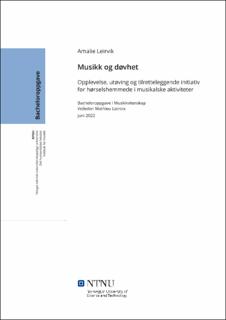| dc.contributor.advisor | Lacroix, Mathieu | |
| dc.contributor.author | Leirvik, Amalie | |
| dc.date.accessioned | 2022-07-09T17:19:34Z | |
| dc.date.available | 2022-07-09T17:19:34Z | |
| dc.date.issued | 2022 | |
| dc.identifier | no.ntnu:inspera:112790664:64924786 | |
| dc.identifier.uri | https://hdl.handle.net/11250/3004320 | |
| dc.description.abstract | En sosial utfordring vi står ovenfor i dag er at døve og hørselshemmede blir ekskludert og isolert i det norske samfunnet, og at den hørende verden dominerer i alle sosiopolitiske og institusjonelle ledd. På scenen, i det musikalske fellesskapet og i kunsten er det også hørselsfriske og funksjonsfriske som dominerer, og dette gjør at flere med hørselsutfordringer og funksjonsnedsettelser faller utenfor viktige fellesskap. Forskning viser at døvhet og musikk lar seg forene. Grunnet manglende kompetanse og et misforstått bilde av hvordan hørselshemmede opplever lyd og musikk, er det gjentagende at hørselshemmede faller bort fra musikkundervisning, mangler tilbud for musikalske aktiviteter og tilrettelegging. I denne teksten argumenteres det for at hørselshemminger ikke utelukker musikalsk forståelse og engasjement, og at musikkmiljøet taper en ressurs ved å ikke tilrettelegge for en musikalsk aktivitet som inkluderer hørselshemmede. | |
| dc.description.abstract | A social challenge we stand over today is that deaf and hearing impaired gets excluded and isolated from the Norwegian society, and that the hearing world dominates in every socio-political and institutional organ. On the stage and in the musical- and art community, it’s also the normal hearing and the nondisabled people who dominate, and that makes people with hearing disabilities and other disabilities fall out of important communities. Research demonstrate how music and deafness can be reconciled. Because of a lack of competence and a misunderstood understanding of how hearing-impaired experience sound and music, it is repetitive that hearing impaired fall out of music classes and are missing musical activities and facilitations. Based on studies and research, I argue that hearing-impairments don’t exclude musical understanding and engagement, and that the musical environment loses a resource by not facilitate for musical activity that includes hearing-impaired. | |
| dc.language | nob | |
| dc.publisher | NTNU | |
| dc.title | Musikk og døvhet | |
| dc.type | Bachelor thesis | |
